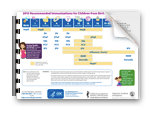Immunization Information: Infants & Young Children
Infants and children ages 0 to 6 years need immunizations (vaccines) to protect them from dangerous infectious diseases. These diseases can cause serious complications and death in babies and children who are not immunized.
Thanks to vaccines, many infectious diseases that were once common in the United States have been controlled. Recent outbreaks of pertussis and measles show that vaccines are still important. Today, immunized infants and children are much less likely to experience serious diseases such as polio, measles, pertussis (whooping cough), rubella, mumps, tetanus, and varicella (chicken pox).
Vaccines help prevent infectious diseases and save lives. By immunizing on time, you can protect your baby or child and also protect others at home, school, or daycare.
Current Recommended Immunizations for Children (Birth through 6 years) Recommended Immunizations for Children
Recommended Immunizations for Children
Requirements for Child Care, Preschool, and Schools
Information about Individual Vaccines
Vaccine Information Statements (VISs) are information sheets produced by the Centers for Disease Control and Prevention (CDC). VISs explain both the benefits and risks of a vaccine. Prior to vaccine administration, a VIS must be provided for all vaccines identified by Federal law.
The most up-to-date collection of VISs is available at: www.immunize.org/vis/
Additional information about individual vaccines is available at: www.vaccineinformation.org/
Make an Instant Immunization Schedule for Your Child
This CDC website will make a printable recommended immunization schedule for your child based upon the selected date of birth.

Vaccine Safety
Research has demonstrated that the childhood vaccine schedule and combination of vaccines are safe and effective. Vaccines are held to the highest standard of safety. The United States currently has the safest, most effective vaccine supply in history. There is no scientific evidence that childhood immunizations cause autism or that giving multiple shots can harm or “overload” the immune system of infants or children. Side effects can occur with any medicine, including vaccines. Slight discomfort (such as pain at the injection site) is a common, non-serious side effect. Serious reactions to vaccines are very rare. Anyone who receives a vaccine should be informed about both the benefits and risks of vaccination. More information on vaccine safety is available at: Vaccine Safety | Vaccine Safety | CDC
If your child has a reaction following a vaccination, you can report it to a national vaccine safety surveillance program—the Vaccine Adverse Event Reporting System (VAERS): http://vaers.hhs.gov/index
Thinking about Waiting to Vaccinate or Not Vaccinating?
Parents who choose not to vaccinate their children on time increase the risk of disease and death not only for their children, but also for other children and adults throughout the entire community.
Any questions or concerns should be discussed with a health care provider.
Please also see: Questions Parents May Ask about Vaccines | Childhood Vaccines | CDC and visit the American Academy of Pediatrics’ Vaccine Safety Information and “Why Immunize?” online resources.
Missed Vaccinations
Did your child miss a dose or fall behind schedule on recommended vaccines? Use the free Catch-up Immunization Schedule for Children and Adolescents | Vaccines & Immunizations | CDC and work with your child’s doctor to get your child safely back on track.
Planning International Travel?
Find information about recommended travel vaccines for infants and children here.
If your child does not have health insurance or you cannot afford immunizations
The Orange County Health Care Agency provides free immunizations for children ages 18 and under at 1725 W. 17th Street, Santa Ana, California, 92706.
Do you have questions about where to get vaccines for your child?
Call the Orange County Health Referral Line at (800) 564-8448.
How Well-Vaccinated Is Your Child's Kindergarten?
Visit https://www.cdph.ca.gov/Programs/CID/DCDC/Pages/Immunization/School/HowDoing.aspx